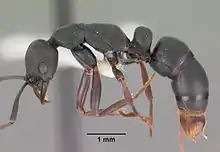Leptogenys
Leptogenys is a genus of ants in the subfamily Ponerinae.[2][3] Leptogenys is the most diverse ponerine ant genus in the world; it is widespread throughout tropical and subtropical regions and there are over 260[1] extant species described. Most species have ergatoid queens, and many have falcate, bowed mandibles and are specialists on isopod prey.[4]
| Leptogenys | |
|---|---|
 | |
| L. maxillosa worker from the Seychelles | |
| Scientific classification | |
| Domain: | Eukaryota |
| Kingdom: | Animalia |
| Phylum: | Arthropoda |
| Class: | Insecta |
| Order: | Hymenoptera |
| Family: | Formicidae |
| Subfamily: | Ponerinae |
| Tribe: | Ponerini |
| Genus: | Leptogenys Roger, 1861 |
| Type species | |
| Leptogenys falcigera Roger, 1861 | |
| Diversity[1] | |
| 266 species | |
| Synonyms | |
|
Dorylozelus Forel, 1915 | |
Description
The ant genus Leptogenys is one of the most diverse and abundant ponerines throughout the tropical and subtropical regions . The genus has attracted attention due to its wide variety of social organizations and colony structures as well as its remarkably diverse range of behaviors. Leptogenys range from large-eyed epigaeic (living or foraging primarily above ground) species to small-eyed cryptobiotic species that inhabit the soil layers or forage through the leaf litter. Such variation occurs across the geographical distribution of the genus. The maxillosa species-group includes widespread species that have expanded well beyond their native ranges. The worker caste of the genus can be distinguished largely by the distinct pectinate ventral margin of the tarsal claws.[4]
Taxonomy
The taxonomic history of the genus Leptogenys includes several junior synonyms as a result of the remarkable morphological diversity in the group. Several genera and subgenera were described by earlier ant taxonomists based on variation in the shape of the mandible, the number of mandibular teeth, the form of the clypeus, the presence of teeth on the anterior clypeal margin, and the number of peg-like teeth on the ventral margin of the tarsal claws. Leptogenys now includes the following junior synonyms: Prionogenys, Lobopelta, Odontopelta, Machaerogenys, Dorylozelus, and Microbolbos. These genera originally were in their own tribe, Leptogenyini, but the morphological features used to separate this group were eventually considered insufficient, and Brown (1963) synonymized the tribe with Ponerini. A molecular phylogenetic study of the Ponerinae by Schmidt (2013) corroborates the placement of Leptogenys in the Ponerini.[4]
See also
References
- Bolton, B. (2014). "Leptogenys". AntCat. Retrieved 4 July 2014.
- "Genus: Leptogenys". antweb.org. AntWeb. Retrieved 23 September 2013.
- Hita Garcia, F.; Wiesel, E.; Fischer, G. (2013). "The Ants of Kenya (Hymenoptera: Formicidae)—Faunal Overview, First Species Checklist, Bibliography, Accounts for All Genera, and Discussion on Taxonomy and Zoogeography". Journal of East African Natural History. 101 (2): 127. doi:10.2982/028.101.0201. S2CID 84797311.
- Rakotonirina, Jean Claude; Fisher, Brian L. (2014). "Revision of the Malagasy ponerine ants of the genus Leptogenys Roger (Hymenoptera: Formicidae)". Zootaxa. 3836 (1): 1–163. doi:10.11646/zootaxa.3836.1.1. PMID 25081576.
- Brown, W.L. Jr. (1963). "Characters and synonymies among the genera of ants, part 3. Some members of the tribe Ponerini". Breviora 190: 1–10.
- Roger, J. (1861). "Die Ponera-artigen Ameisen (Schluss)". Berliner Entomologische Zeitschrift 5: 1-54.
- Schmidt, C. (2013). "Molecular phylogenetics of ponerine ants (Hymenoptera: Formicidae: Ponerinae)". Zootaxa, 3647: 201–250.
 This article incorporates text from a scholarly publication published under a copyright license that allows anyone to reuse, revise, remix and redistribute the materials in any form for any purpose: Rakotonirina, Jean Claude; Fisher, Brian L. (2014). "Revision of the Malagasy ponerine ants of the genus Leptogenys Roger (Hymenoptera: Formicidae)". Zootaxa. 3836 (1): 1–163. doi:10.11646/zootaxa.3836.1.1. PMID 25081576. Please check the source for the exact licensing terms.
This article incorporates text from a scholarly publication published under a copyright license that allows anyone to reuse, revise, remix and redistribute the materials in any form for any purpose: Rakotonirina, Jean Claude; Fisher, Brian L. (2014). "Revision of the Malagasy ponerine ants of the genus Leptogenys Roger (Hymenoptera: Formicidae)". Zootaxa. 3836 (1): 1–163. doi:10.11646/zootaxa.3836.1.1. PMID 25081576. Please check the source for the exact licensing terms.
External links
 Media related to Leptogenys at Wikimedia Commons
Media related to Leptogenys at Wikimedia Commons